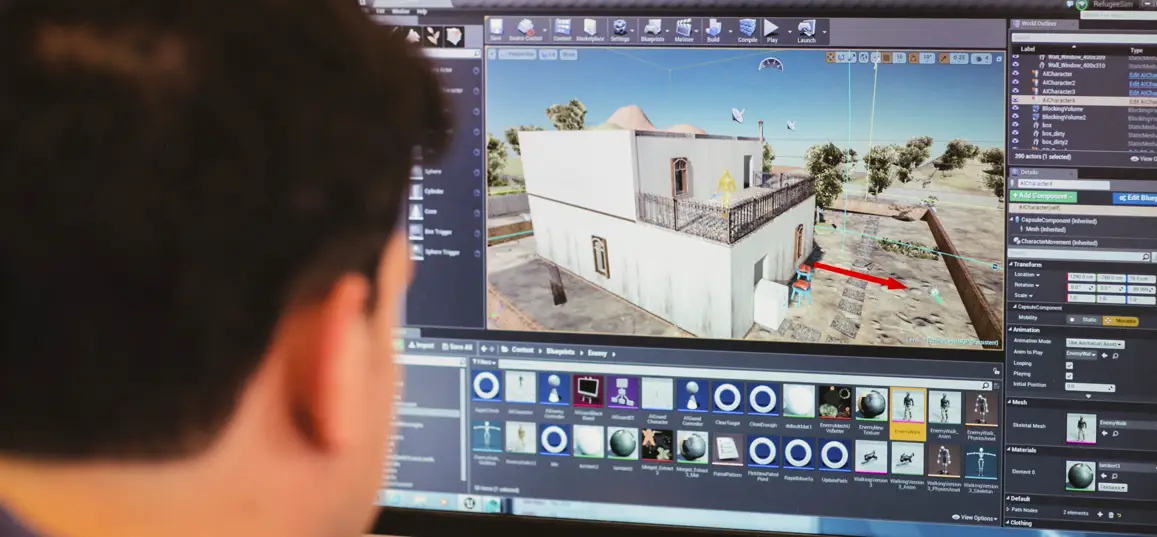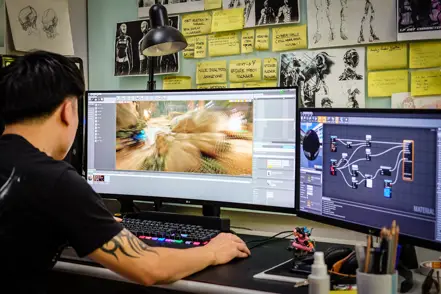Game Programming: Career Opportunities for Game Programmers
In this article, we dive into the exciting world of game development, answering the fundamental question: "How to program games?"
Aniday is your guide on this journey, providing you with comprehensive knowledge and resources to explore the art and science of game programming. Whether you're a novice eager to learn the basics or a seasoned developer looking to enhance your skills, we've got you covered. So, let's embark on this adventure together as we unravel the intricacies of game programming and unlock a world of creativity and innovation.
What is Game Programming?

Game programming is the process of using programming languages to write code for various components of a game, including graphics, sound, gameplay, interface, physics, network functionality, AI, and more. To excel in game programming, you need to combine a diverse set of knowledge and skills, including mathematics, computer science, graphic design, sound design, as well as logic, creativity, and problem-solving abilities.
The Role of a Game Programmer

Game programmers can assume different roles, depending on the size and requirements of the project. Some common roles of game programmers include:
- Gameplay Programmer: Writing code for game features and functions, such as character control, game rules, combat mechanics, and communication.
- Graphics Programmer: Writing code for the game's graphical effects, such as lighting, shadows, dust, and smoke.
- Audio Programmer: Writing code for game sound effects, including background sounds, activity sounds, and communication sounds.
- Network Programmer: Writing code for the game's network-related features, such as server connections, data synchronization, and security.
- AI Programmer: Writing code for the game's AI-related features, such as NPC behavior, enemy paths, and decision systems.
How to Program Games for Beginners
If you want to start learning how to program games from scratch, you should follow these steps:
Learn Background Knowledge
Gain essential knowledge in mathematics and computer science, covering topics like linear algebra, geometry, calculus, probability and statistics, data structures, and algorithms.
Choose the Right Programming Language
Select a programming language that aligns with your goals and abilities effectively. Options include C++, C#, Java, and Python, each with its advantages and uses in the game development process.
Learn Programming Tools
Familiarize yourself with programming tools that assist in creating game components quickly and efficiently. Popular tools include Unity, Unreal Engine, Godot, and GameMaker Studio.
Practice
To become proficient, practice is essential. Start by creating simple games like Flappy Bird, Tetris, and Pong. Participate in game programming competitions and analyze other games to learn and improve your skills.
Workplace of Game Programmers
Aspiring game programmers can pursue their careers in various settings, such as:
Technology Companies
Large and reputable tech companies like Google, Microsoft, Apple, and Facebook, as well as divisions like Google Play, Xbox, Apple Arcade, Oculus, and more, offer opportunities in game programming and related fields.
Game Publishing Companies and Studios
Major companies like EA, Ubisoft, Activision Blizzard, Nintendo, Sony, Valve, and others have numerous game programming positions for well-known projects.
Freelancing
Game programmers can choose to work as freelancers, either by creating their games or taking on programming projects from different clients on freelancer platforms like Upwork, Fiverr, and Freelancer.com.
Career Opportunities for Game Programmers
The field of game programming holds significant growth potential, driven by the increasing demand for entertainment and learning experiences. The global gaming market reached a revenue of $175.8 billion USD in 2020 and is expected to grow to $218.7 billion USD by 2023. Vietnam, too, is experiencing rapid growth in its gaming market.
With these trends, game programmers have diverse career opportunities. They can work for domestic or international companies and studios, start their own businesses, or specialize in various areas of game development, including graphics, sound, gameplay, AI, and more.
Game Programmer Salary in Singapore

As of my last knowledge update in September 2021, the salary of a game programmer in Singapore can vary depending on several factors, including the individual's experience, skills, the specific company or studio they work for, and the complexity of the projects they are involved in. Game programmer salaries can also be influenced by the demand for game development talent in the region.
Here is a general overview of game programmer salary ranges in Singapore:
- Junior Game Programmer (Entry Level): Salaries for junior game programmers in Singapore typically range from SGD 3,000 to SGD 5,000 per month. Entry-level positions may require minimal industry experience and are often for recent graduates.
- Mid-Level Game Programmer: Game programmers with a few years of experience can expect higher salaries. Mid-level positions may offer salaries ranging from SGD 5,000 to SGD 8,000 per month.
- Senior Game Programmer: Senior game programmers with significant experience and expertise can command higher salaries. Salaries for senior positions may start from SGD 8,000 per month and can go well beyond SGD 10,000 per month, depending on the specific company and project.
- Lead Game Programmer: Lead programmers who take on leadership roles within game development teams may earn even higher salaries. Their earnings can vary widely but often exceed the figures mentioned for senior programmers.
It's important to note that the game development industry in Singapore has been growing, and there is a demand for skilled professionals. Salaries may also be influenced by the studio's reputation, the type of games being developed, and the overall economic conditions.
In conclusion, "How to Program Games" has been explored comprehensively in this article, courtesy of Aniday. From unraveling the intricacies of game programming to uncovering career prospects and salary expectations for aspiring game developers, we've strived to provide a comprehensive guide to this dynamic field.
We hope that this article by Aniday has proven to be an invaluable resource for those embarking on their journey into the world of game development. Whether you're an enthusiastic beginner or a seasoned professional, may the insights shared here propel you toward success in the exciting realm of game programming
Aniday's HR Services
Headhunting Service
Find and recruit quality candidates in just 1 week! Supported by 40,000 experienced headhunters in IT, Finance, Marketing… capable of recruiting in any region.
Headhunting Service ➔Employer of Record (EOR) Service
On behalf of your business, we recruit employees and handle payroll without the need to establish a company in markets such as Vietnam, Singapore, Malaysia, India, Indonesia…
Employer of Record (EOR) Service ➔